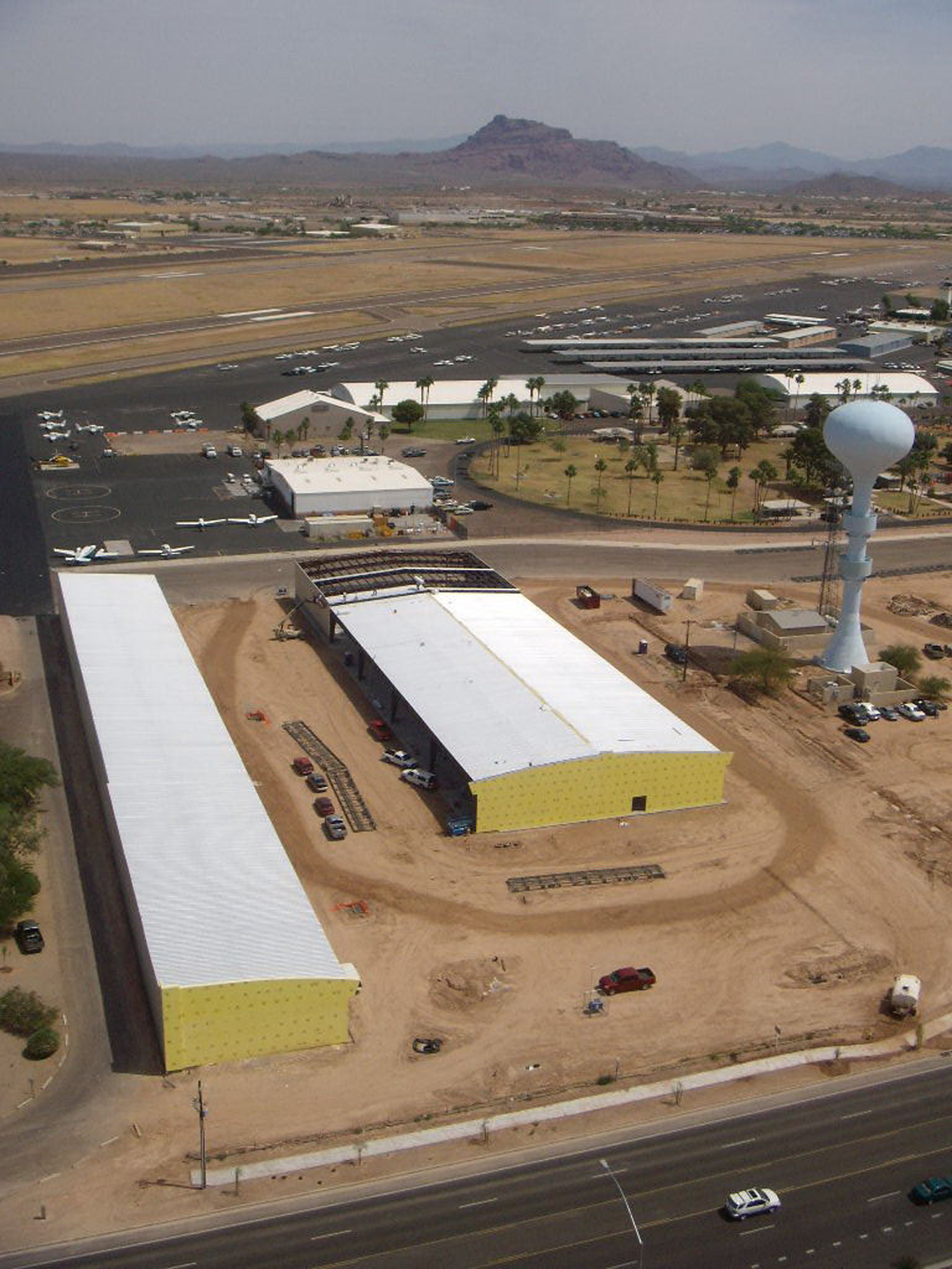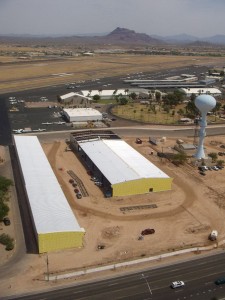
Desert Jet Center at Falcon Field Airport in Mesa, Ariz. will offer high-end, fully finished hangar facilities for owners of very light jets and other high-tech aircraft.
By Clayton Moore
Falcon Field Airport (FFZ) in Mesa, Ariz. is coming to its modern fruition with the ongoing construction of a 230,000-square-foot complex newly branded as Desert Jet Center. Designed and backed by a former aviation industry professional and enthusiastic proponent of general and corporate aviation, the new hangar and office development promises a significant boost in both economic development and airport traffic to the airfield.
Falcon Field originally opened in 1941 as a pilot training base for Royal Air Force pilots during World War II, and is historic for fielding the first training flight of the Boeing PT-17 Stearman biplane. After the war, the city of Mesa took over operations, and it has since become of the more significant general aviation airports in the United States.
Its new development is the result of a 50-year lease on a lonely 14 acres formerly dominated by a blue water tower many locals used as a landmark. Falcon 7 LLC, a corporation backed by a conglomerate of firms specializing in architecture, planning and building, secured the lengthy lease.
The guiding force behind the development is Alan House, a partner in the development and the founder of [i]Plan LLC, a major architectural design firm based in Mesa, and its sister firm [i]Build, which makes the firm’s home and office designs a reality. During his 18 years of experience in the aerospace industry, House worked on a variety of projects, including service as a flight test mechanic for Learjet and as a flight test engineer on the Apache Helicopter for Hughes Helicopters. He started his design firm with the intent of bringing the efficiency and excellence of aerospace processes to the field of architecture.
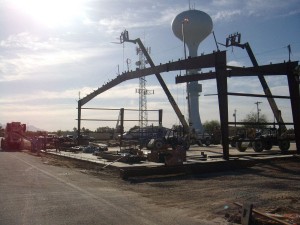
This lonely water tower used to dominate the Desert Jet Center site, which will now be filled by 55 aircraft hangars and 70,000 square feet of office space.
“If it’s got an engine in it, it appeals to me,” said the architect and current pilot, who owns an RV4 kit plane and a Robinson R44 helicopter, as well as a garage full of sports cars.
Located at the northwest corner of McKellips Road and Falcon Drive, the Desert Jet Center complex is being built in three phases. This spring saw the completion of the first phase of the project, and the developers have already leased 14 of the 17 condo hangars available. The project will ultimately include a total of 55 hangars and approximately 70,000 square feet of Class A office space.
The [i]Plan office is directly adjacent to Falcon Field, where House saw an emerging need at the airport that his development could fill.
“It’s been a neat full circle,” he said. “A real need for executive hangars has developed here. There’s a 10-year wait for a hangar in the first place, and with the very light jets coming out, those owners want a lot more than is being offered.”
Sized at 61 feet wide by 55 feet deep, the hangars in the first phase have been designed to appeal to owners of executive aircraft who want a high-class space in which to work, house aircraft and vehicles, and entertain clients. Each hangar is equipped with 60-foot wide Schweiss electric bi-fold doors with remote control, secure gate entry, upgraded insulation, center floor drains and extensive electrical and data cabling. The rental rate for units starts at $3,355 per month.
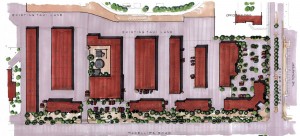
This site plan shows the configuration of Desert Jet Center’s plans for their property at Falcon Field. A Sam’s Club and other retail facilities are being constructed directly south of the development.
Optional amenities include upgraded lighting, heating and air conditioning, in-hangar restrooms with showers, 24-hour Internet-based surveillance and even a wet bar. The first unit under construction includes a mezzanine office, a bowling alley, game area and a movie screen.
“This is a totally finished high-end product,” House said. “There’s nothing left out. No one is going to come along and say they don’t want one of these hangars because it doesn’t include something. We can offer everything you could ever possibly put in a hangar.”
House believes the demographics of Mesa and the appeal of Falcon Field will ensure a consistent base of customers for Desert Jet Center.
“There’s a lot of executive housing around here, and those are the guys who owned the high-end aircraft,” he said. “Falcon Field is, by far, the best general aviation airport in this valley. At 5,500 feet, the runway lengths are perfect for the VLJs, but they’re not so long that they’re going to get pushed out by bigger aircraft the way they are at other airports in the region. I think the VLJs will always be at the top of the heap here. Aircraft owners are more comfortable coming here and knowing that they’ll get to stay here forever.”
Other nearby services that either are already in place or under construction include several restaurants, a Wal-Mart, a Sam’s Club, a major hotel chain and other retail services.
“If you go to Scottsdale, it’s a one-mile walk to get to any restaurant,” House said. “Here, you push the walk button and cross the street. Everything a person could want is within a 100-yard walk of these hangars.”
Tenants already booked for office space at Desert Jet Center include a corporate headquarters for a flight school, several aerospace-related companies and a fuel distributor.
“All our tenants are aviation-related and very compatible with each other,” House said. “We’re very cognizant of the compatibility factor when we’re considering our tenant mix. It’s something we’ve learned from watching the shopping and retail centers.”
House anticipates the lease to boost airport revenue by $180,000 and create 100 or more new jobs. That fact pleases Corinne Nystrom, Falcon Field Airport director.
“This project will not only help to address the demand for additional hangar space and reduce the number of people on our hangar waiting list, but will also generate additional revenue for the airport and provide a sustainable, positive economic impact on Falcon Field Airport and the city of Mesa,” she said in a statement.
House pointed out Nystrom as one of the most outspoken supporters of Desert Jet Center and a moving force behind the development’s success.
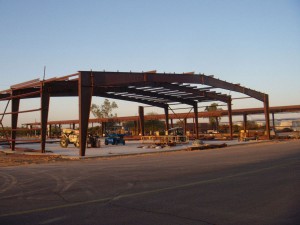
Lots of steel is being erected at Falcon Field, as Desert Jet Center’s extensive hangar facilities join retail outlets and other business development at the growing airport.
“The airport management here is absolutely the best,” he said. “Corinne has a vision for this airport that parallels our own and is the single best city employee with whom we’ve ever worked.”
Grubb & Ellis is leasing the project, constructed by Rigco Contracting, which put up the steel, and Carume Construction, which managed the infrastructure for the development.
“This project has been the most fun out of all the projects that I’ve done,” House said. “It’s because these guys are so professional that we didn’t have one hiccup throughout construction. We’ve had fewer problems on this project than on a typical custom home and this development is 20 times as big and far more complicated.”
In short, Desert Jet Center has been designed to be simply perfect. It’s a lesson that House learned from his years in the aviation industry.
“One of the things I learned at Learjet is that if you do something right the first time, you’ll never have a problem,” he said. “Just do the absolute best you can do and there will never be any question about selling your product. That’s what we’re doing here at Desert Jet Center.”
For more information on Desert Jet Center, visit [http://www.desertjetcenter.com].











